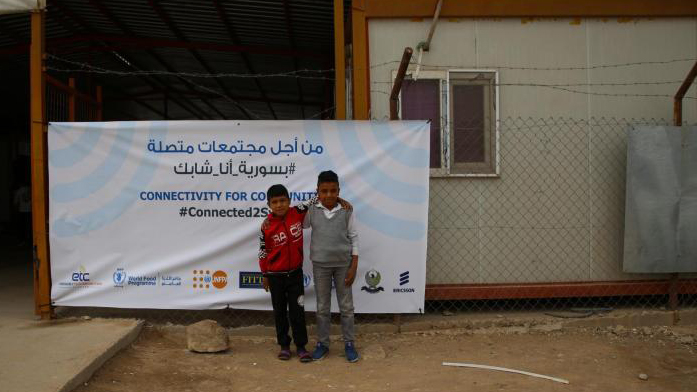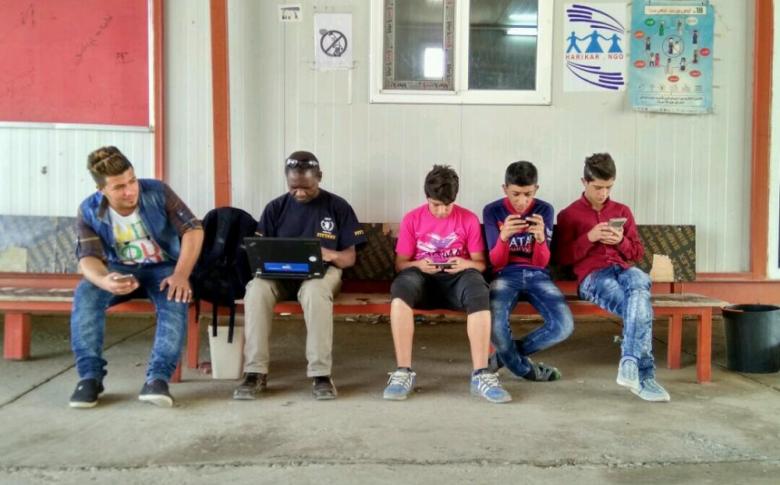
ETC provides Internet to the community for the first time in its history

Under the grey skies of Domiz camp, the oldest and largest of Iraq’s refugee camps home to more than 31,000 Syrians, the mood was celebratory. A band, Sardam, made up of Syrian guys living in Domiz, played Kurdish songs as people poured into the tiny UN Population Fund (UNFPA) Youth Centre. Groups of children drifting to and from school stopped to have their photos taken; two small boys enthusiastically started helping to offload boxes of juice from a truck. One girl with freckles across her nose asked us, “What is the party for?”
The party – which it was in the end with traditional dancing, singing and a cake, complete with ETC logo perfectly iced on – was to celebrate a key milestone. For the first time in its history, the WFP-led ETC is now providing Internet connectivity to the affected community. The excitement that had built up in the days and weeks leading up to the event didn’t prepare anyone for the energy and volume of people who came to participate. Everyone from locally-based humanitarian staff, national media, UN Country Directors, including Sally Haydock, WFP Iraq Country Director, and the Assistant Governor of Dohuk came to visit this project that had been quietly operating under the radar since the project kicked off in July.
What Connectivity Means to Syrian Refugees
While the air outside was thick with smoke blowing in from the fields of Mosul, the camp residents themselves took control of preparations, a real sense of pride in what they were part of. Two young Syrians, Jumana and Mohammed, spoke to the crowd about what this connectivity means to them. Accessing the Internet helps improve their English – through online classes or YouTube videos – look for job opportunities, interact on social media to tell their stories, share information about humanitarian assistance distribution schedules, and to try and forge a sense of community within the camp. The heart of the project is, of course, that the Internet allows them to keep in touch with family and friends who have been scattered by war.

You just need to take a look at the numbers coming out of the Internet usage at the youth centre to get an idea of how interest has skyrocketed since July. Two UNFPA staff who help to distribute Internet vouchers at the centre, register all the information by hand. While laborious, it is accurate.
Since July, the number of users of the ETC Internet service in the UNFPA Youth Centre has increased from 24 to 115 at the end of October. Of the 115 users last month, 81 were male and 34 female; more than 50% under the age of 18. Now that the ETC is providing services at its second site, an Internet café in a UN Refugee Agency (UNHCR) pre-fab, these numbers are set to rise further.
First Time ETC Provides Services for Communities
Rami Shakra, ETC Coordinator in Iraq and the force behind the project, said that getting to this point required building relationships with the community, with UNFPA – who agreed to host the ETC Internet service – and establishing credibility: “You need someone on the frontline, going from camp to camp, meeting the community and creating the connections. And that is not a technical solution.”
Jane Pearce, the former WFP Country Director in Iraq was one of the first supporters of the Connectivity for Communities project and was instrumental in ensuring the wheels got going. Speaking before she left her post in the summer, Jane spoke about the poignancy of many Syrian children missing out on their education. She said: “We go and sit in the camps and the kids always say, ‘I want a future; I want to learn’ so to be putting Internet connectivity into this youth centre means we can contribute towards that.
“This will hopefully be the first of a series so the ETC can transfer focus to the people rather than those serving the people and this has huge implications for us because if everyone has connectivity then we can monitor, evaluate, assess, so it opens up a lot of possibilities going forward.”
Would she consider this project part of her legacy in Iraq? Leaning back in her chair, a mug of steaming tea in front of her, she said, “That’s a nice way of thinking of it. Yes, I’ve been really touched by the young people and the school-age people and have been frustrated at my ability to do something to help except to say nice things and visit them. Now, I can leave something behind that can help them, so I’m really pleased about that.”
Next Step: Internet for the Entire Camp
She appears to have done just that. It is the passion of the ETC team on the ground that has driven this project forward. Buoyed by its success, there are tentative plans to take it further: to provide Internet for the entire camp, all camps in Iraq, the region, globally… If harnessed correctly, the potential is boundless.
Of course, the hope is always that one day, there will be no one to provide the Internet for in the camp; that they will all have returned home. But for now, the ETC is reaching out directly to the community, providing a lifeline to the outside world and to their families. And for that, the value of having the Internet and the value of what the ETC has achieved in this small corner of a massive camp is priceless.
By Suzanne Fenton, IT Emergency Preparedness & Response branch, World Food Programme